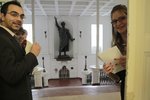A New Reformed Collegium for Roma Students in Debrecen
2012. június 19., keddThe István Wáli Reformed Roma Collegium, which currently hosts 16 students, officially started its operation in September 2011. The Collegium was established as part of the Christian Roma Collegium Network to provide Roma students participating in higher education with accommodation, mentoring and additional courses to complement their school studies.
"Our goal is to break through and show an example," declared the students of the newly opened István Wáli Reformed Roma Collegium (WISZ) in Debrecen. They believe that in spite of the prejudices they have to face in society, the university and the Collegium gives them strength to prove to their fellow Roma students that studying can be a means to rise above their circumstances. Inside the walls of the Collegium, the "tenants" experience real fellowship.
The Collegium was named after István Wáli, Reformed theologian, who from 1756 until about 1780 served as a Reformed minister in Almás (present day Dunaalmás). His scientific discoveries relating to the origin of the Roma language are still considered fundamental in the field of linguistics.
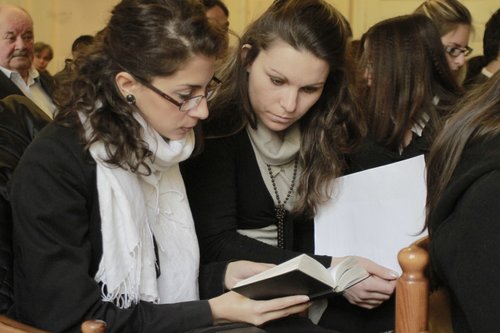
At the beginning of the term, 16 Gypsy or partly Gypsy students – nine girls and seven boys – moved into the first floor rooms of the Maróthi György Kollégium building, which belongs to the Transtibiscan Reformed Church District and the Reformed Collegium of Debrecen. Seven of the students are Reformed, some are Roman or Greek Catholic, but the group also contains members of free Christian churches. Although the Collegium itself represents Reformed values, the ecumenical world view is also part of its philosophy.
The Collegium's programmes are open for non-Roma students as well, but the institution offers accommodation and financial support to Gypsy candidates exclusively. As only a very low percentage of Gypsies have the opportunity to study at universities or colleges, the István Wáli Collegium intends to provide these students with more benefits.
"The results of the entrance exam were beyond our expectations. We are extremely proud of our students," said Anikó Uhrin, principal of the Collegium. "It was evident from the psychological tests that each student has at least a 110 IQ quotient, but some have even higher than 132. Certain students are very sensitive socially, others have excellent leader's skills."
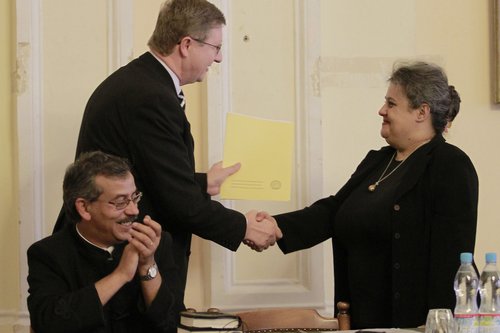
The entrance examination consisted of three parts. First of all, the applicants had to take part in a guided conversation with a mentor where they had the chance to voice their objectives and motivations. Then they had to take a personality and an IQ test, which were followed by an oral examination in front of the committee board.
The educational programme commenced in September 2011, and since the students moved in they have had the opportunity to attend a weekly church service. Those who have visited the university congregation are also offered spiritual consultation twice a week. Students have to choose from three obligatory educational modules (general knowledge, culture and spirituality), which will actively affect their personality development. They also receive a monthly scholarship, and mentors supervise and monitor their spiritual and academic progress. Workers of the Collegium hope to send socially sensitive young adults into Hungarian society: intellectuals with a real calling and a Christian identity.
The Reformed Church is planning to establish a Roma Collegium in every town that has a college or university. Szeged and Pécs might be joining the network next year.
Most of the students major in science, such as physics or engineering, whereas the others chose humanities (social studies, foreign languages or theology). German lessons are also offered for those who are interested. As part of the cultural module, students approach the topic of Roma– non-Roma connections from several perspectives. In the future the institution hopes to provide computer and English classes as well. It is in the Hungarian society's interest to raise a well-trained group of Roma intellectuals, but in order to achieve that goal, more and more Roma students must participate in higher education, and join the Collegium network.
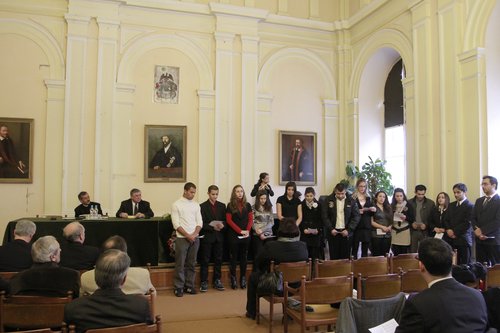
The Christian Roma Collegium Network's official ecumenical opening ceremony took place in Budapeston September 13, 2011, in the Jesuit Roma Collegium's building. The network presently consists of four members in four large cities of Hungary: Budapest, Debrecen, Miskolc and Nyíregyháza. These four institutions are maintained by four denominations: the Jesuit Order (Budapest), the Reformed Church (Debrecen), the Greek Orthodox Church (Miskolc) and the Lutheran Church (Nyíregyháza).
At the ceremony, Gusztáv Bölcskei, Presiding Bishop of the Reformed Church in Hungary announced that the Church will do everything possible to support these exceptional young people in their efforts to achieve their goals in society. The Collegium Network is not only an example for establishing connection between Roma and non-Roma, but it also serves as a healthy example of cooperation between churches and denominations, as well as the Hungarian state. Creating the proper spiritual environment in the churches for Roma members to feel more comfortable and accepted has nowadays become a vitally important issue.
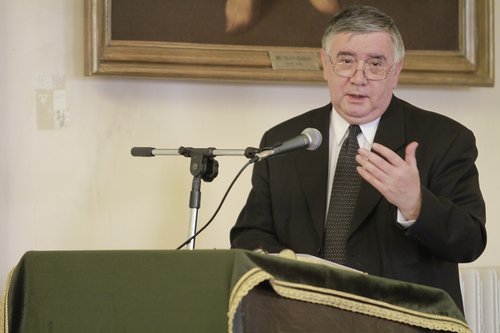
Zoltán Balog, formerly Minister of State for Social Inclusion at the Ministry of Public Administration and Justice and current Minister of Human Resources, shared the most essential elements of the social inclusion strategy. The government wishes to start nursery school education at the earliest stage possible, so that children are given the support they need. However, this needs to happen in cooperation with the children's families. The scholarship programme is designed to help both the students and the teachers who prepare and mentor them. The annual budget of the social inclusion programme is over 10 billion HUF.
According to Mr. Balog, the social inclusion plan cannot be realised with only money. The participants themselves need to be actively involved in the process, joining in the efforts to improve their situation in society and in their own environment. He also stated that the government expects church institutions to raise such young people who strive for tolerance and reject hatred.
As Mr. Balog summarized the thought behind the network, "We have to learn to look at each other as members of the same nation. We have to learn what Roma represent in their own culture, point of view and life situation, but we also have to learn what it means to have a Hungarian identity. Our future depends on these things. The Hungarian government considers the Roma Collegium Network as a good investment, as the students who will later leave these institutions will hopefully become effective mouthpieces of their own people, and they will be able to show how Hungarians and Roma can live together in agreement."
www.reformatus.hu
Translated by Katalin Burns
Contact us
Click here if you are interested in twinning.
Reformed Church in Hungary
Address: H-1146 Budapest, Abonyi utca 21.
PO Box: 1140 Budapest 70, Pf. 5
Email: oikumene@reformatus.hu
English, German and Korean language services in Budapest
Links
Recommended articles
-
Pastoral Letter in the Light of the Pandemic
Bishop Dr. István Szabó sent a pastoral letter of encouragement to the ministers serving in RCH’s congregations, expressing his gratitude for the persistence and creativity of the pastors.
-
RCH Joins in Pope's Call for Prayer
RCH published the call on congregations to join the initiative of Pope Francis, supported by ecumenical organisations, to unite in praying the Lord’s Prayer on Wednesday, 25 March, at noon.
-
English Speaking Worship Services Online
Each Sunday at 11 AM (CET) the St. Columba's Church of Scotland in Budapest, the international community of RCH invites you to join the worpship service on its facebook page.
-
Test of Humanity and Companionship
Reformatus.hu asked Dr. György Velkey, Director General of the Bethesda Children’s Hospital of RCH about the challenges of health care workers and ways of prevention against the pandemic.
-
All Church Events Suspended
In light of the coronavirus the Presidium of RCH requested congregations to suspend all church events with immediate effect. Beside restrictions, it calls for prayer, sobriety and responsibility.

